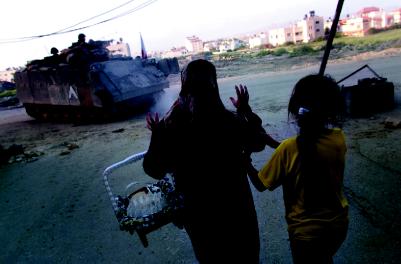The deaths of 2 Palestinian physicians at the hands of Israeli soldiers have drawn strong reprimands from the Medical Network, the 120-member section of Amnesty International Canada that promotes health care workers' concerns about human rights abuses. More than half its members are physicians.
The criticism followed the deaths in March of Drs. Khalil Suleiman and Ahmad Nu'man Sabih Al-Khoudari. The Medical Network says Suleiman, head of the Palestine Red Crescent Society Emergency Medical Services, was shot and killed Mar. 4 when his ambulance was fired on by Israeli soldiers in the West Bank town of Jenin. The ambulance was carrying an injured girl at the time.
A statement from the Israeli Defence Forces (IDF) that was provided by the Israeli Embassy in Ottawa said the IDF had “no intention to harm the innocent, and the initial investigation into the incident found that the soldiers acted out of self-defence, after the ambulance charged toward them at a high speed from an area in which there were exchanges of fire.”
Al-Khoudari, the director of a small hospital, died Mar. 8 after he was shot by Israeli troops as he drove to a refugee camp near Bethlehem. Amnesty International (AI) said he had received permission from the local Israeli commander to pick up medical supplies at a hospital and was allowed to pass the first checkpoint. However, as he neared the camp an Israeli tank opened fire, killing him. “He had received assurances from an Israeli official that his security would be respected,” the bulletin says. The Israeli Embassy said it had no information about the incident.
The Israeli army says much of the blame for such deaths lies with the Palestinians, whom they allege have used ambulances for military purposes during the current intifada. David Cooper, a spokesperson at the Israeli Embassy in Ottawa, described the doctors' deaths as “unfortunate” but said inadvertent death and injury are by-products of war. “I know how the Palestinians are framing it,” he said, “but Israeli forces do not do something like this on purpose.”
Cooper noted that the first female suicide bomber to strike in Israel, Wafa Idris, was a paramedic. He also said that a “suicide vest” filled with explosives was found inside another ambulance. The Palestinians say any arms found in their ambulances were planted by Israeli troops.
The Medical Network says 17 Palestinian doctors and nurses have been killed since the intifada began in 2000. It also acknowledges that 3 medical personnel were injured when a suicide bomber attacked an Israeli clinic in Efrat on Mar. 31.
The network says that major population centres that were under Israeli occupation this spring suffered “massive disruptions of medical and health care services” before the troops withdrew. At the height of the fighting, says AI, “personnel and ambulances were barely able to move without risk of being shot at, [and] patients were killed or wounded while seeking medical care.”
Seven Red Crescent ambulances were destroyed or damaged beyond repair during the fighting.
Amnesty International says it wants changes on both sides. It asked the Palestinian Authority to call for an end to attacks against Israeli civilians and to respect the neutrality of medical posts and vehicles.
It has asked the Israelis to ensure that patients seeking care and the people who provide it are not attacked, and that patients needing care be allowed through checkpoints.
Dr. Donald Payne of Toronto, the Medical Network's coordinator, says it is becoming difficult to raise these issues in Canada. “The situation has become very politicized, with the focus being on whether one supports or condemns one side or the other,” says Payne. “When this outlook takes precedence, one loses track of the fact that human rights abuses should be condemned, no matter who commits them.”
Since the intifada began in September 2000, more than 1400 Palestinians and over 500 Israelis have died in related violence. — Patrick Sullivan, CMAJ

Figure. No guarantees for the innocent Photo by: Canapress


